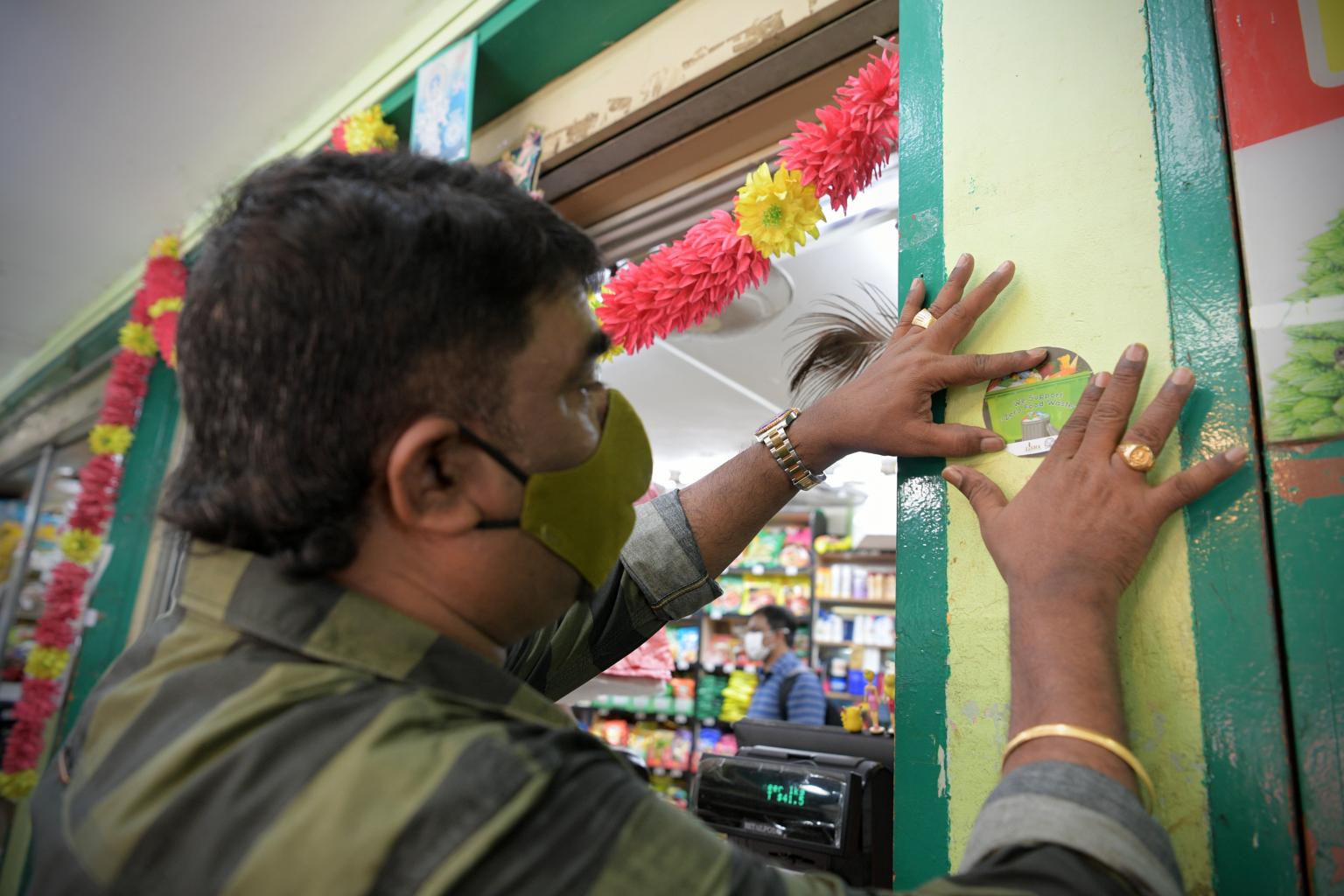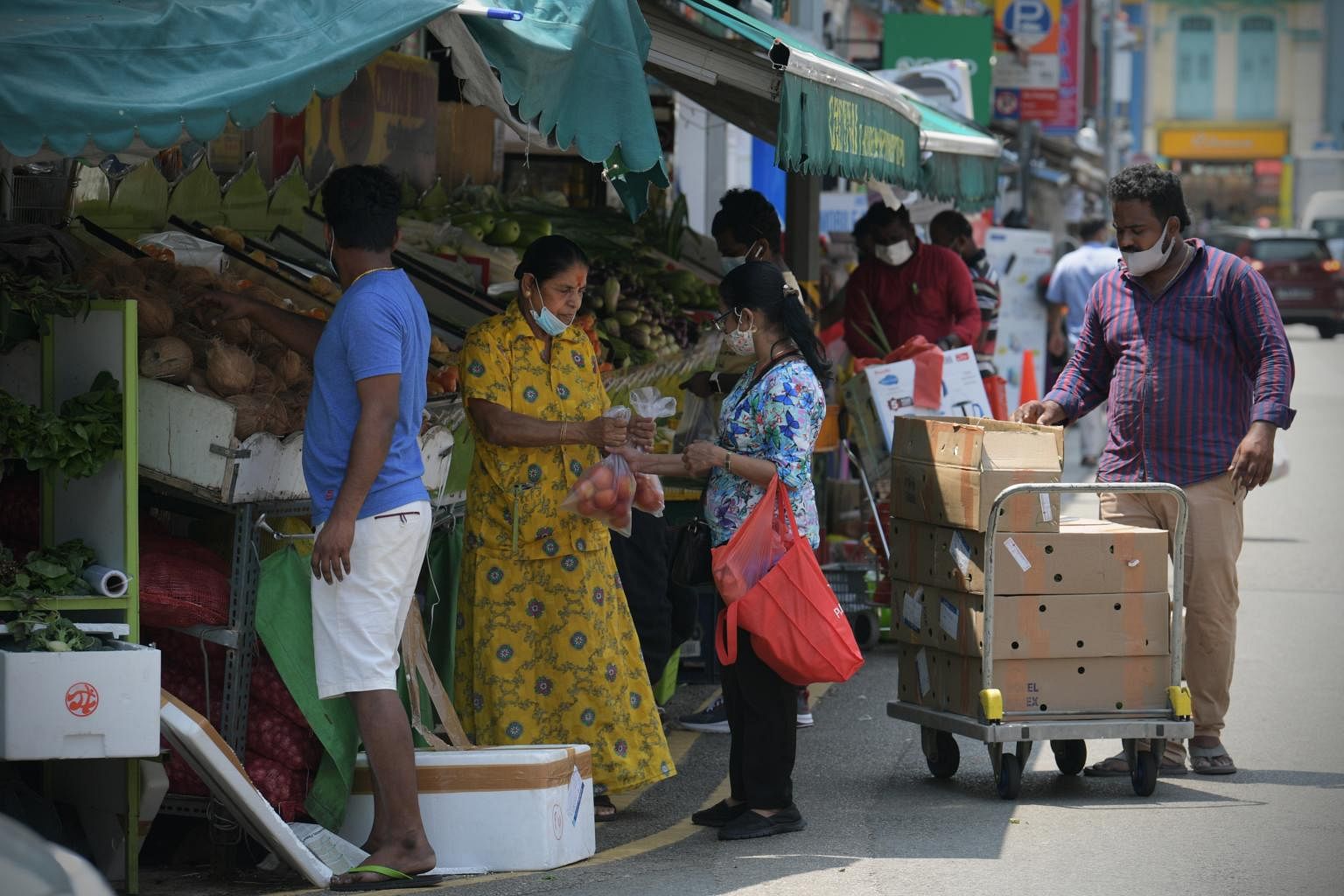Little India restaurants and stores commit to fighting food waste
Sign up now: Get ST's newsletters delivered to your inbox

Restaurants and stores that are committed to the cause will receive decals that say We Support “Zero Food Wastage”.
ST PHOTO: NG SOR LUAN
SINGAPORE - Restaurants and stores in Little India have committed to slashing food waste, and some have already started to take active measures to tackle the issue.
A "Little India Goes Green" campaign was launched on Saturday (Feb 27) with an introductory webinar which saw speakers from the National Environment Agency, and food distribution associations such as the Food Bank Singapore offer solutions on how to reduce and prevent food waste in restaurants and provision shops.
Little India's campaign to address food waste is organised by the women's wing of the Little India Shopkeepers and Heritage Association (Lisha), and the Indian Restaurant Association of Singapore.
"No matter how carefully shopkeepers plan their inventory, at times, unexpected slowdown happens in businesses, causing some food to near their expiry dates," said Ms Joyce Kingsly, founder of Lisha Women's Wing.
"Lisha is aware of the struggles of merchants and restaurants. We are trying to find ways in which merchants could work towards clearing products that near expiry."
There are about 70 restaurants and 200 grocery stores in Little India, said Ms Kingsly.
Senior Minister of State for Sustainability and the Environment Amy Khor, who delivered the opening speech at the introductory webinar, commended current efforts by some Little India shopkeepers to cut food waste.
For food products that are nearing their expiry date, she noted that many stores would sell them at a discounted price or give them to customers for free. She added that some shops are working with SG Food Rescue - an organisation that collects unsold food and redistributes them to the community - to salvage excess food, which are used to stock up community fridges.
Chennai Trading and Supermart is among those that sell nearly expired vegetables at a lower price to restaurants and customers.
"We've also sold dates, wheat flour and soft drinks at 'buy one, get one free' offers when their expiry dates are near. If the foods are very close to expiry, we will give them to customers for free, and ask them to consume before the expiry date," said Mr Rama Murthy, the supermart's director said.
Dr Khor pointed out that the potential for businesses to reduce food waste is immense in Little India as the area has more than 80 food-related establishments .
"The best way to reduce food waste is to avoid wasting food at the onset," she said.
She said more establishments, for instance, could collaborate with food distribution organisations. Businesses could also tap technology such as food waste digesters and treatment machines to convert food into animal feed, compost or fertiliser.
Dr Khor also pointed out the potential for new business opportunities from combating food waste, citing social enterprise UglyFood, which sells bruised but edible fresh produce by sourcing them from supermarkets and importers.
During the webinar, Mr S. Mahenthiran, honorary secretary of the Indian Restaurants Association of Singapore, noted that most Indian restaurants would display multiple trays of cooked food behind the counter for customers. Some of that food would not be sold at the end of the day.
"Not everything on the menu has to be prepared in advance. We can also have a chiller next to the display counter to keep marinated dishes. And upon order, you can cook the dishes. This way, you can still keep the uncooked food in the chiller for use the next day," he said.
Mr Mahenthiran also reminded merchants and restaurants not to be swayed by deals and discounts for bulk orders from suppliers, as some of the items could end up not being needed.

In 2019, 744,000 tonnes of food waste was generated in Singapore, making up 10 per cent of the total waste in the country.
ST PHOTO: NG SOR LUAN
Mr Shanmugam Ganesan, director of Gayatri Restaurant said that prior to the Covid-19 pandemic when buffets were allowed, he would leave instructions to cook only 60 per cent of the food in advance.
"We also ensure that limited cooked food are kept in the hot cabinets and over-cooking is controlled. Raw items such as chicken skin are sold for recycling."
In 2019, 744,000 tonnes of food waste was generated in Singapore, making up 10 per cent of the total waste in the country. Only less than one-fifth of that food waste was recycled, and the rest was thrown away.
Under the Singapore Green Plan 2030, which was announced early this month, a key target is to cut daily waste sent to the landfill by 20 per cent by 2026, and to 30 per cent by 2030.


